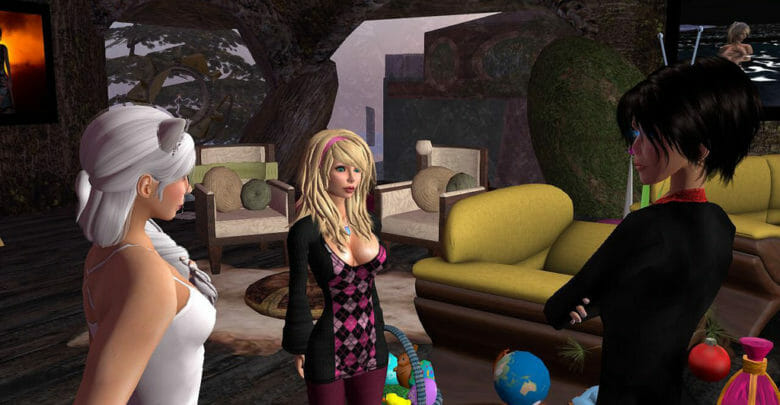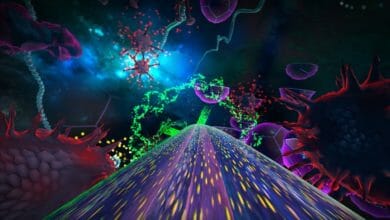THE MIND IS (NOT JUST) THE BRAIN

by
Over on her blog, my dear friend Gwyneth Llewelyn has written an article called “Tackling The Self” which is jam packed with the kinds of speculation I just love to indulge in. Basically, the article explores the two main questions of philosophies of self and personal identity: What is the self, exactly, and how can something change and yet remain the same?
What I want to do here is focus on one particular point that is made at various times throughout Gwyn’s article. This is the belief that the mind is the brain. A better way to put it would be to say the mind is what the brain does. I reckon most people find this concept rather hard to grasp. Can it really be true that this spongey thing encased within my skull is me? It just does not seem possible that consciousness can be reduced to a few pounds of meat.
If you deny that the brain is not all there is to the mind, where does that leave you? Apparently, quite a few people believe it leaves you lost in that dead end of speculation known as dualism. I speak from experience. I have been chairing discussions in Second Life for years and whenever the topic is about the mind or the self or consciousness and someone says they believe the mind cannot be reduced to the brain, somebody else always responds by accusing them of dualism. This is another way of saying your position is philosophically redundant.
But must you be a dualist in order to believe the mind is more than just the brain? I don’t think that is the case at all. To see why, we shall just suppose that the mind really can be reduced to the brain. Now, consider the following thought experiment. Thanks to advances in genetic engineering, scientists are able to modify an ovum so that, once fertilized, it will not develop into a complete human being but only a human brain. The fertilized ovum is placed in a vat that protects it from harm and feeds it all the necessary nutrients and stuff it needs to grow.
Now, suppose you waited a decade, which would be sufficient time for any normal brain to have a childlike mind. Would our brain in a vat have developed a childlike mind? Well, if the mind just is the brain, why would this not be the case? The entire genetic recipe needed to build a brain was present and allowed to carry out its instructions, so ifthe mind really is nothing but the brain. surely our brain in a vat would have to develop a mind at some point.
Well, actually, no. This brain in a vat would not come to have the mind of a human child. In fact, I doubt it would have any kind of mind at all. There is something vital missing that is absolutely necessary for the healthy development of a human mind. That thing, is a stimulating environment. I have supposed that the vat supplies the ovum with all the nutrients and organic building blocks it requires to build a brain, but other than that the growing brain is in complete sensory deprivation. Many studies have shown that, when denied certain stimuli, brains will just not develop the requisite functions that allow us to make sense of that stimuli. For instance, in one experiment kittens were raised at birth in boxes whose walls were painted with horizontal stripes. They became cats who would walk into table legs and other vertical objects because they simply could not see them. There was nothing wrong with their eyes. Their visual cortex had not been trained to recognize vertical objects at a crucial time during the brain’s development.
So, I think we can safely say that our brain in a vat would, at best, develop a mind that was profoundly disabled. Yes, there might be something in there that we might call a mind of some sort. I am not trying to argue that ‘nurture’ (ie the physical environment in which we grow up) is totally responsible for making minds, leaving ‘nature’ (ie the inbuilt tendencies bequeathed to us by our genetic code) with nothing to do. But I severely doubt that this mind would develop into anything we would regard as ‘human’.
Well, then, if a stimulating environment is such a necessity for the development of a mind, we have a perfectly justifiable and non-dualist reason for believing there is more to making a mind than just the brain, after all. Gwyn and I both like to point out that the world we perceive is really just a mental model. Our minds make the world. But, equally, the world makes our minds. Shakespeare once compared the world to a stage but actually that seems like an inadequate analogy. The world is no mere passive backdrop against which we act out our lives. It is actively involved in shaping our minds, even as our minds extend out into it in order to shape it to suit our purpose.
Actually, Shakespeare might have been more correct than I have supposed, because a fascinating study into the cognitive abilities of stage actors reveals the extent to which we rely on our world to help us perform certain mental abilities. E. Tribble wrote an article for the ‘Shakespeare Quarterly’ in 2005 called ‘Distributing Cognition In The Globe’. Early modern acting companies required their actors to put on as much as six different plays per week. How could they possibly learn so many lines? According to Tribble’s article, we must look beyond the mind of the actor and ‘recognize the complex interplays between actor recall and the specially engineered spaces and social practices of the early modern theatre’ (Andy Clark, ‘Supersizing The Mind’). In other words, the theatre itself, both in terms of the physical layout of each set and the learned practices and conventions of the day, served as what Andy Clark described as “an object lesson in the power and scope of distributed and situated cognition”.
We are familiar with the concept of objects in the physical world extending our physical abilities. But we should also recognize that we adopt objects in the physical world to aid our mental abilities, too. For instance, my essays never take proper shape until I start to type them out. If I merely think about what I want to write, the best I can come up with is vague ideas with no real structure to them. It is like I need the word processor or pen and paper in order to properly structure my thoughts. I am reminded of Albert Einstein who once said, “my pencil and I are smarter than I am”. That is a pretty succinct way of describing the position of Andy Clark and David Chalmers’ ‘Active Externalism’, which argues in favour of a very active role of the environment in not only aiding in the development of cognitive processes, but also driving them:
“Epistemic action, we suggest, demands spread of epistemic credit. If, as we confront some task, a part of the world functions as a process that, were it done in the head, we would have no hesitation in recognizing as part of the cognitive process, then that part of the world is (so we claim) part of the cognitive process”.
If they are correct (and I believe they are) surely we must conclude that the mind extends beyond the confines of the skull and is more than just the brain? You do not have to be a dualist to suppose that a mind cannot be reduced to the brain alone, you only have to understand what a vital role the world around plays every second of every day, in order for us to possess that wonderful thing known as a conscious self.





